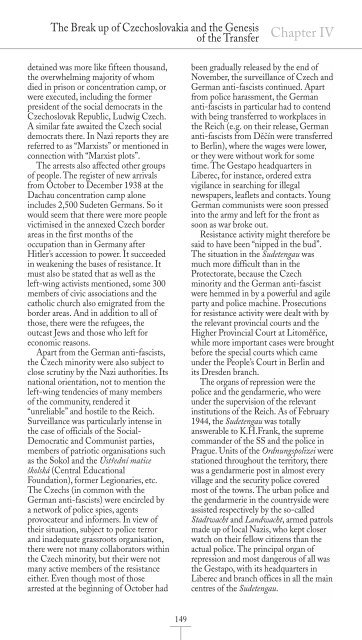the nationality of all inhabitants of the czech provinces and ...
the nationality of all inhabitants of the czech provinces and ...
the nationality of all inhabitants of the czech provinces and ...
You also want an ePaper? Increase the reach of your titles
YUMPU automatically turns print PDFs into web optimized ePapers that Google loves.
The Break up <strong>of</strong> Czechoslovakia <strong>and</strong> <strong>the</strong> Genesis<br />
<strong>of</strong> <strong>the</strong> Transfer<br />
detained was more like fifteen thous<strong>and</strong>,<br />
<strong>the</strong> overwhelming majority <strong>of</strong> whom<br />
died in prison or concentration camp, or<br />
were executed, including <strong>the</strong> former<br />
president <strong>of</strong> <strong>the</strong> social democrats in <strong>the</strong><br />
Czechoslovak Republic, Ludwig Czech.<br />
A similar fate awaited <strong>the</strong> Czech social<br />
democrats <strong>the</strong>re. In Nazi reports <strong>the</strong>y are<br />
referred to as “Marxists” or mentioned in<br />
connection with “Marxist plots”.<br />
The arrests also affected o<strong>the</strong>r groups<br />
<strong>of</strong> people. The register <strong>of</strong> new arrivals<br />
from October to December 1938 at <strong>the</strong><br />
Dachau concentration camp alone<br />
includes 2,500 Sudeten Germans. So it<br />
would seem that <strong>the</strong>re were more people<br />
victimised in <strong>the</strong> annexed Czech border<br />
areas in <strong>the</strong> first months <strong>of</strong> <strong>the</strong><br />
occupation than in Germany after<br />
Hitler’s accession to power. It succeeded<br />
in weakening <strong>the</strong> bases <strong>of</strong> resistance. It<br />
must also be stated that as well as <strong>the</strong><br />
left-wing activists mentioned, some 300<br />
members <strong>of</strong> civic associations <strong>and</strong> <strong>the</strong><br />
catholic church also emigrated from <strong>the</strong><br />
border areas. And in addition to <strong>all</strong> <strong>of</strong><br />
those, <strong>the</strong>re were <strong>the</strong> refugees, <strong>the</strong><br />
outcast Jews <strong>and</strong> those who left for<br />
economic reasons.<br />
Apart from <strong>the</strong> German anti-fascists,<br />
<strong>the</strong> Czech minority were also subject to<br />
close scrutiny by <strong>the</strong> Nazi authorities. Its<br />
national orientation, not to mention <strong>the</strong><br />
left-wing tendencies <strong>of</strong> many members<br />
<strong>of</strong> <strong>the</strong> community, rendered it<br />
“unreliable” <strong>and</strong> hostile to <strong>the</strong> Reich.<br />
Surveillance was particularly intense in<br />
<strong>the</strong> case <strong>of</strong> <strong>of</strong>ficials <strong>of</strong> <strong>the</strong> Social-<br />
Democratic <strong>and</strong> Communist parties,<br />
members <strong>of</strong> patriotic organisations such<br />
as <strong>the</strong> Sokol <strong>and</strong> <strong>the</strong> Ústřední matice<br />
školská (Central Educational<br />
Foundation), former Legionaries, etc.<br />
The Czechs (in common with <strong>the</strong><br />
German anti-fascists) were encircled by<br />
a network <strong>of</strong> police spies, agents<br />
provocateur <strong>and</strong> informers. In view <strong>of</strong><br />
<strong>the</strong>ir situation, subject to police terror<br />
<strong>and</strong> inadequate grassroots organisation,<br />
<strong>the</strong>re were not many collaborators within<br />
<strong>the</strong> Czech minority, but <strong>the</strong>ir were not<br />
many active members <strong>of</strong> <strong>the</strong> resistance<br />
ei<strong>the</strong>r. Even though most <strong>of</strong> those<br />
arrested at <strong>the</strong> beginning <strong>of</strong> October had<br />
149<br />
Chapter IV<br />
been gradu<strong>all</strong>y released by <strong>the</strong> end <strong>of</strong><br />
November, <strong>the</strong> surveillance <strong>of</strong> Czech <strong>and</strong><br />
German anti-fascists continued. Apart<br />
from police harassment, <strong>the</strong> German<br />
anti-fascists in particular had to contend<br />
with being transferred to workplaces in<br />
<strong>the</strong> Reich (e.g. on <strong>the</strong>ir release, German<br />
anti-fascists from Děčín were transferred<br />
to Berlin), where <strong>the</strong> wages were lower,<br />
or <strong>the</strong>y were without work for some<br />
time. The Gestapo headquarters in<br />
Liberec, for instance, ordered extra<br />
vigilance in searching for illegal<br />
newspapers, leaflets <strong>and</strong> contacts. Young<br />
German communists were soon pressed<br />
into <strong>the</strong> army <strong>and</strong> left for <strong>the</strong> front as<br />
soon as war broke out.<br />
Resistance activity might <strong>the</strong>refore be<br />
said to have been “nipped in <strong>the</strong> bud”.<br />
The situation in <strong>the</strong> Sudetengau was<br />
much more difficult than in <strong>the</strong><br />
Protectorate, because <strong>the</strong> Czech<br />
minority <strong>and</strong> <strong>the</strong> German anti-fascist<br />
were hemmed in by a powerful <strong>and</strong> agile<br />
party <strong>and</strong> police machine. Prosecutions<br />
for resistance activity were dealt with by<br />
<strong>the</strong> relevant provincial courts <strong>and</strong> <strong>the</strong><br />
Higher Provincial Court at Litoměřice,<br />
while more important cases were brought<br />
before <strong>the</strong> special courts which came<br />
under <strong>the</strong> People’s Court in Berlin <strong>and</strong><br />
its Dresden branch.<br />
The organs <strong>of</strong> repression were <strong>the</strong><br />
police <strong>and</strong> <strong>the</strong> gendarmerie, who were<br />
under <strong>the</strong> supervision <strong>of</strong> <strong>the</strong> relevant<br />
institutions <strong>of</strong> <strong>the</strong> Reich. As <strong>of</strong> February<br />
1944, <strong>the</strong> Sudetengau was tot<strong>all</strong>y<br />
answerable to K.H.Frank, <strong>the</strong> supreme<br />
comm<strong>and</strong>er <strong>of</strong> <strong>the</strong> SS <strong>and</strong> <strong>the</strong> police in<br />
Prague. Units <strong>of</strong> <strong>the</strong> Ordnungspolizei were<br />
stationed throughout <strong>the</strong> territory, <strong>the</strong>re<br />
was a gendarmerie post in almost every<br />
village <strong>and</strong> <strong>the</strong> security police covered<br />
most <strong>of</strong> <strong>the</strong> towns. The urban police <strong>and</strong><br />
<strong>the</strong> gendarmerie in <strong>the</strong> countryside were<br />
assisted respectively by <strong>the</strong> so-c<strong>all</strong>ed<br />
Stadtwacht <strong>and</strong> L<strong>and</strong>wacht, armed patrols<br />
made up <strong>of</strong> local Nazis, who kept closer<br />
watch on <strong>the</strong>ir fellow citizens than <strong>the</strong><br />
actual police. The principal organ <strong>of</strong><br />
repression <strong>and</strong> most dangerous <strong>of</strong> <strong>all</strong> was<br />
<strong>the</strong> Gestapo, with its headquarters in<br />
Liberec <strong>and</strong> branch <strong>of</strong>fices in <strong>all</strong> <strong>the</strong> main<br />
centres <strong>of</strong> <strong>the</strong> Sudetengau.


